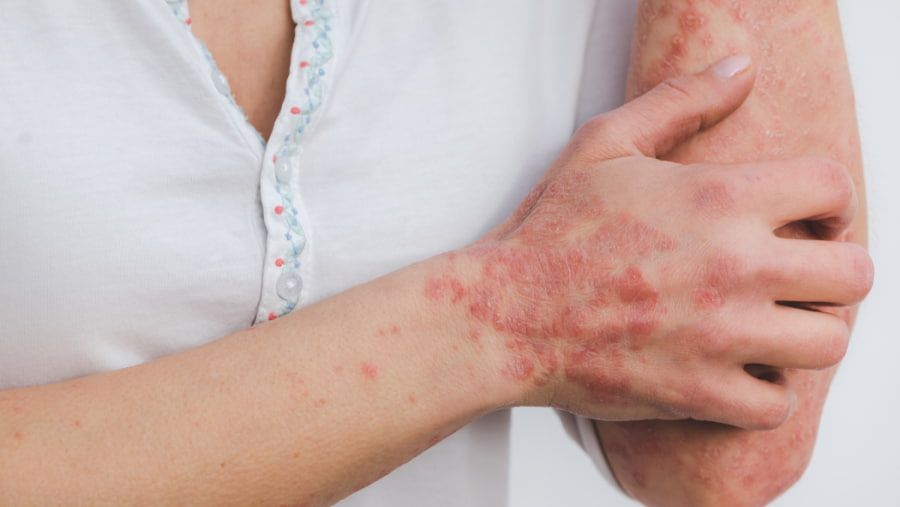What Plaque Psoriasis Looks Like And Treatment Options
Plaque psoriasis is a chronic autoimmune condition. Apart from the physical symptoms, plaque psoriasis can have a significant impact on an individual's psychological well-being, making it crucial to understand the symptoms, causes, and treatment options available. Let's access in-depth information about plaque psoriasis.

Symptoms of Plaque Psoriasis
Plaque psoriasis manifests through several distinct symptoms, including:
1. Red and Inflamed Patches: The most prominent sign of plaque psoriasis is the development of raised, reddish patches on the skin. These patches are often covered with silvery-white scales and can be itchy or painful.
2. Silver or White Scales: The affected areas are typically covered with silvery or white scales, a result of the rapid turnover of skin cells.
3. Dry and Cracked Skin: The patches can cause the skin to become dry, cracked, and sometimes even bleed, leading to discomfort and potential infection.
4. Thickened or Pitted Nails: In some cases, plaque psoriasis can also affect the nails, causing them to become thickened, ridged, or pitted, leading to nail abnormalities.
Causes of Plaque Psoriasis
The exact cause of plaque psoriasis is not fully understood, but several factors are known to contribute to its development:
1. Autoimmune Response: Plaque psoriasis is believed to occur when the immune system mistakenly attacks healthy skin cells, causing an overproduction of skin cells and inflammation.
2. Genetic Predisposition: There is a genetic component to plaque psoriasis. Individuals with a family history of the condition are at a higher risk of developing it, highlighting the influence of genetic factors.
3. Environmental Triggers: Certain environmental factors, such as stress, skin injuries, infections, and certain medications, can trigger or exacerbate flare-ups of plaque psoriasis.
Treatment Options for Plaque Psoriasis
The management of plaque psoriasis involves a multidimensional approach that includes various treatment options:
1. Topical Treatments: These include corticosteroids, calcipotriene (a form of vitamin D), and retinoids, which are applied directly to the skin to reduce inflammation and slow down the growth of skin cells.
2. Phototherapy: Phototherapy, or light therapy, involves exposing the skin to ultraviolet light, whether from natural sunlight or artificial light sources, to help reduce the symptoms of plaque psoriasis.
3. Systemic Medications: In cases of severe or resistant plaque psoriasis, systemic medications may be prescribed. These include methotrexate, cyclosporine, biologic agents, and oral retinoids. These medications work to suppress the immune response that drives the overproduction of skin cells.
4. Lifestyle and Home Remedies: Managing stress, maintaining a healthy weight, avoiding smoking, and keeping the skin moisturized can have a positive impact on managing plaque psoriasis symptoms.
Psychological Impact
Beyond the physical symptoms, plaque psoriasis can significantly affect an individual's quality of life. The visibility of the skin lesions can lead to feelings of self-consciousness, embarrassment, and even depression in some cases. It is essential for individuals with plaque psoriasis to seek emotional support and consider counseling or therapy to address the psychological impact of the condition.
The Role of Dermatologists
Dermatologists play a pivotal role in diagnosing and managing plaque psoriasis. They can provide a thorough evaluation, recommend appropriate treatment options, and offer ongoing support and guidance to help individuals effectively manage their condition.
In conclusion, enhanced awareness and understanding of plaque psoriasis can lead to better outcomes and improved quality of life for individuals living with this chronic condition. Plaque psoriasis is a complex and challenging skin condition that requires a comprehensive approach to diagnosis and treatment. By understanding the symptoms, causes, and available treatment options, individuals affected by plaque psoriasis can work with their healthcare providers to develop a personalized treatment plan that effectively manages their symptoms and improves their quality of life. It is essential for those experiencing symptoms of plaque psoriasis to seek guidance from a healthcare professional, ideally a dermatologist, for an accurate diagnosis and the most appropriate treatment.
Guess you like
-

Cheap Mobility Scooters for US Seniors
-

Where to Find All-Inclusive Luxury Overwater Bungalows Without Straining Your Budget
-

How to Choose the Right Online Marketing Degree
-

Unlock Affordable High-Speed Internet for Businesses
-

Why We Need Cybersecurity Software to Protect Our Data
-

Heat Pumps: A Wise Choice for Heating Old Buildings?



